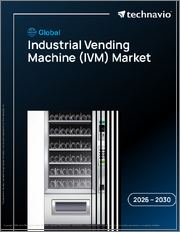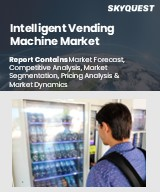
|
시장보고서
상품코드
1846058
지능형 자동판매기 시장 규모 : 기계 유형별, 제품 유형별, 용도별, 지역별 범위 및 예측Global Intelligent Vending Machine Market Size By Machine Type, By Product Type, By Application, By Geographic Scope And Forecast |
||||||
지능형 자동판매기 시장 규모와 예측
지능형 자동판매기 시장 규모는 2024년에 81억 9,000만 달러로 평가되었으며, 2024년부터 2031년까지 13.11%의 CAGR로 성장하여 2031년에는 201억 달러에 달할 것으로 예측됩니다.
지능형 자동판매기란 터치스크린, 무현금 결제, 클라우드 연결 등 최신 기술을 통해 상품을 제공하고 사용자 경험을 향상시키는 자동화 시스템입니다.
이 자동판매기는 센서, 카메라, 데이터 분석을 결합하여 운영을 최적화하고 재고를 추적하며 맞춤형 마케팅을 제공합니다. 지능형 자동판매기는 스낵, 음료, 가젯, 신선식품 등 다양한 상품을 판매할 수 있습니다. 공항, 병원, 대학, 사무실 등 다양한 장소에서 빠르게 이용되고 있으며, 제품 및 서비스를 쉽게 이용할 수 있도록 하고 있습니다.
세계 지능형 자동판매기 시장 역학
지능형 자동판매기 시장을 형성하는 주요 시장 역학은 다음과 같습니다:
주요 시장 촉진요인
현금 없는 결제 시스템 도입 증가 : 디지털 결제 방법의 보급이 지능형 자동판매기 개발에 박차를 가하고 있습니다. 미국 연방준비제도이사회(Fed)의 추산에 따르면, 2023년 미국 내 현금 결제는 전체 거래의 18%를 차지할 것으로 예상되며, 2019년 26%에서 감소할 것으로 보입니다. 이러한 추세는 자동판매기 운영자에게 다양한 전자결제를 수용하기 위한 시스템 개선을 촉구하고 있습니다.
24시간 365일 자동 소매 솔루션에 대한 수요 증가 : 24시간 365일 언제든지 상품을 구하고자 하는 수요가 지능형 자동판매기 시장을 주도하고 있습니다. 미국 자동판매기협회(NAMA)의 2023년 조사에 따르면, 미국 자동판매기 매출은 약 360억 달러에 달하며, 스마트 자동판매기 설치 대수는 전년 대비 15% 증가했습니다.
데이터 중심의 재고 관리 : 지능형 자동판매기는 실시간 재고 추적 및 분석을 제공하여 업무 효율성을 높입니다. 미국 상무부에 따르면, 스마트 자동판매기와 같은 IoT 기반 재고 관리 솔루션을 사용하는 기업은 2023년 기존 자동판매기 운영과 비교해 재고 소진을 30% 줄이고 전체 매출을 25% 증가시켰다고 합니다.
주요 과제
인프라 및 접근 제한 : 지능형 자동판매기의 효과적인 도입은 안정적인 인터넷 접속 및 전력 공급 등 견고한 인프라에 크게 의존합니다. 지방이나 인구가 적은 지역에서는 이러한 인프라가 부족하기 때문에 자동판매기의 효과와 효율성이 떨어지고, 그 결과 운영상의 문제가 발생하여 시장 침투가 제한적일 수밖에 없습니다.
소비자 거부감 : 많은 잠재적 사용자들은 기계의 신뢰성과 사용성, 특히 위생과 신뢰성에 대한 우려를 가지고 있습니다. 소비자들은 기존의 자동판매기 방식에 익숙해져 있어 지능형 솔루션 도입에 소극적이어서 시장 성장을 저해하고 이러한 첨단 기술의 보급을 가로막고 있습니다.
주요 동향:
첨단 기술 통합 : 인공지능(AI), 머신러닝, 사물인터넷(IoT) 기능의 추가는 자동판매기의 기능을 향상시킵니다. 이러한 기술은 실시간 재고 추적, 예지보전, 개인화된 사용자 경험을 제공합니다. 그 결과, 운영자는 상품 제공을 극대화하고 업무 효율성을 높일 수 있기 때문에 지능형 자동판매기는 기업과 소비자 모두에게 더 바람직합니다.
현금 및 비접촉식 결제 옵션으로의 전환 : 고객의 선호도가 변화함에 따라 지능형 자동판매기는 모바일 지갑 및 비접촉식 카드와 같은 디지털 결제 솔루션을 탑재하게 될 것입니다. 이러한 전환은 사용자의 편의성을 높일 뿐만 아니라, 현금 없는 구매를 지향하는 세계 트렌드에 대응하고 있습니다. 더 많은 소비자 기반을 구축하고 원활한 거래를 보장하기 위해 다양한 결제 수단을 수용하는 능력이 점점 더 중요해지고 있습니다.
지능형 자동판매기의 다양한 환경으로의 확산 : 지능형 자동판매기는 교통기관, 교육기관, 의료시설, 기업 사무실 등 다양한 분야에서 빠르게 활용되고 있습니다. 이를 통해 기업은 소비자의 다양한 요구와 취향에 부응하면서도 신속하게 상품을 공급할 수 있게 되었습니다. 과자부터 가전제품까지 다양한 제품을 제공할 수 있는 지능형 자동판매기의 적응성은 산업을 불문하고 널리 받아들여지는 요인이 되고 있습니다.
목차
제1장 소개
- 시장 정의
- 시장 세분화
- 조사 방법
제2장 주요 요약
- 주요 조사 결과
- 시장 개요
- 시장 하이라이트
제3장 시장 개요
- 시장 규모와 성장의 가능성
- 시장 동향
- 시장 성장 촉진요인
- 시장 성장 억제요인
- 시장 기회
- Porter's Five Forces 분석
제4장 지능형 자동판매기 시장 : 자동판매기 유형별
- 음료 자동판매기
- 스낵 자동판매기
- 콤비네이션 자동판매기
제5장 지능형 자동판매기 시장 : 기술 유형별
- 캐시리스 결제 시스템
- 원격 모니터링·관리 시스템
- 터치스크린 인터페이스
제6장 지능형 자동판매기 시장 : 최종 이용 산업별
- 소매업
- 교통 허브
- 헬스케어 시설
- 교육기관
- 기업 오피스
- 오락시설
제7장 지역 분석
- 북미
- 미국
- 캐나다
- 멕시코
- 유럽
- 영국
- 독일
- 프랑스
- 이탈리아
- 아시아태평양
- 중국
- 일본
- 인도
- 호주
- 라틴아메리카
- 브라질
- 아르헨티나
- 칠레
- 중동 및 아프리카
- 남아프리카공화국
- 사우디아라비아
- 아랍에미리트
제8장 시장 역학
- 시장 성장 촉진요인
- 시장 성장 억제요인
- 시장 기회
- COVID-19의 시장에 대한 영향
제9장 경쟁 구도
- 주요 기업
- 시장 점유율 분석
제10장 기업 개요
- Crane Co.
- Advantech Co. Ltd.
- Azkoyen Group
- FAS International S.p.A.
- Bianchi Vending Group S.p.A.
- Rhea Vendors Group
- N&W Global Vending S.p.A.
- Westomatic Vending Services Ltd.
- Sanden Corp.
- Seaga
- Jofemar
- Royal Vendors
- Intel Corporation(through its subsidiary Fujitsu)
- Glory Ltd.
- Ingenico S.A.
- Compass Group USA Inc.
- Fuji Electric Co., Ltd.
- R.S. Hughes Co., Inc.
제11장 시장 전망과 기회
- 신기술
- 향후 시장 동향
- 투자 기회
제12장 부록
- 약어 리스트
- 정보 출처와 참고문헌
Intelligent Vending Machine Market Size and Forecast
Intelligent Vending Machine Market size was valued at USD 8.19 Billion in 2024 and is projected to reach USD 20.1 Billion by 2031, growing at a CAGR of 13.11% from 2024 to 2031.
An intelligent vending machine is an automated system that delivers products and enhances the user experience with modern technology such as touchscreens, cashless payments, and cloud connectivity.
These machines combine sensors, cameras, and data analytics to optimize operations, track inventories, and deliver customized marketing. Intelligent vending machines can dispense various products, including snacks and beverages, gadgets, and fresh food. They are rapidly being used in various places, including airports, hospitals, universities, and offices, to enable easy access to products and services.
Global Intelligent Vending Machine Market Dynamics
The key market dynamics that are shaping the intelligent vending machine market include:
Key Market Drivers
Increasing Adoption of Cashless Payment Systems: The proliferation of digital payment methods is fueling the development of intelligent vending machines. According to a Federal Reserve estimate, in 2023, cash payments in the United States accounted for 18% of all transactions, down from 26% in 2019. This trend is encouraging vending machine operators to improve their systems to accept a variety of electronic payments.
Growing Demand for 24/7 Automated Retail Solutions: The demand for 24/7 access to items is driving the intelligent vending machine market. According to a 2023 study by the National Automatic Merchandising Association (NAMA), vending machines in the United States generated around $36 billion in revenue, with smart vending machine installations increasing by 15% year on year.
Emphasis on Data-driven Inventory Management: Intelligent vending machines provide real-time inventory tracking and analytics, which increases operational efficiency. According to the US Department of Commerce, firms that use IoT-enabled inventory management solutions, such as smart vending machines, experienced a 30% reduction in stockouts and a 25% boost in overall sales in 2023 compared to traditional vending operations.
Key Challenges:
Limitations on Infrastructure and Access: The effective implementation of intelligent vending machines is strongly reliant on robust infrastructure, including dependable internet access and power supply. In rural or underdeveloped locations, when such infrastructure is lacking, the effectiveness and efficiency of these devices suffer, resulting in operating challenges and limited market penetration.
Consumer Reluctance: Many potential users are concerned about the machines' reliability and usability, particularly in terms of hygiene and trust. Because consumers are accustomed to traditional vending methods, their reluctance to embrace intelligent solutions stifles market growth and prevents widespread adoption of these advanced technologies.
Key Trends:
Integration of Advanced Technologies: The addition of artificial intelligence (AI), machine learning, and Internet of Things (IoT) capabilities improves the functionality of vending machines. These technologies offer real-time inventory tracking, predictive maintenance, and individualized user experiences. As a result, operators can maximize product offers and boost operational efficiency, making intelligent vending machines more desirable to both businesses and consumers.
Shift Towards Cashless and Contactless Payment Options: As customer preferences shift, intelligent vending machines become more equipped with digital payment solutions such as mobile wallets and contactless cards. This switch not only makes things easier for users but also corresponds with the global trend toward cashless purchases. The ability to accept numerous payment methods is increasingly important for establishing a larger consumer base and ensuring smooth transactions.
Deployment of Intelligent Vending Machines in Diverse Environments: These machines are rapidly being used in a variety of contexts, including transit hubs, educational institutions, medical facilities, and corporate offices. This development enables firms to meet diverse consumer demands and preferences while giving quick access to items. Intelligent vending machines' adaptability in delivering a wide range of things, from snacks to electronics, contributes to their widespread acceptance across industries.
Global Intelligent Vending Machine Market Regional Analysis
Here is a more detailed regional analysis of the intelligent vending machine market:
North America:
According to Verified Market Research, North America is estimated to dominate the market over the forecast period. North America leads in the deployment of contactless payment technologies, which is fueling the expansion of intelligent vending machines. According to a 2023 report by the Federal Reserve Bank of San Francisco, 78% of US consumers used contactless payment methods for transactions, up from 65% in 2021. This trend has resulted in a 40% increase in the installation of smart vending machines capable of collecting various types of digital payments around the region.
The increased health consciousness among North American customers is driving demand for intelligent vending machines that can deliver fresh, nutritious items. A poll done by the National Automatic Merchandising Association (NAMA) in 2023 indicated that 65% of vending machine users in North America choose machines that offer healthier snack and meal options. This has resulted in a 35% year-over-year increase in the deployment of refrigerated intelligent vending machines capable of maintaining food freshness.
Furthermore, the integration of Artificial Intelligence (AI) and Internet of Things (IoT) technologies in retail is driving the intelligent vending machine market in North America. According to a 2023 report from the US Department of Commerce, retail enterprises that implemented AI and IoT technology, such as smart vending machines, witnessed an average 22% boost in operational efficiency and an 18% reduction in maintenance expenses. From 2022 to 2023, the number of AI-enabled vending machines installed in North America increased by 50%.
Europe:
Europe region is estimated to exhibit substantial growth within the market during the forecast period. Europe has experienced a considerable move towards contactless and cashless payments, which is pushing the use of intelligent vending machines. According to the European Central Bank's 2023 payment statistics report, the percentage of contactless payments in the EU increased from 41% in 2019 to 62% in 2023. This trend has resulted in a 35% year-over-year increase in the installation of smart vending machines with contactless payment systems throughout Europe.
European customers and governments are increasingly prioritizing sustainability, driving up demand for energy-efficient and ecologically friendly vending solutions. According to the European Environment Agency's 2023 poll, 73% of European consumers prefer to buy from businesses that exhibit environmental responsibility. This has led to a 45% rise in the deployment of energy-efficient, smart vending machines across the EU between 2021 and 2023.
Furthermore, the integration of artificial intelligence (AI) and Internet of Things (IoT) technologies in retail is propelling the intelligent vending machine market in Europe. According to the European Commission's Digital Economy and Society Index (DESI) report for 2023, 58% of European firms were utilizing AI technologies, up from 42% in 2021. This has led to a 50% increase in AI-enabled vending machines in Europe between 2022 and 2023, with capabilities including predictive maintenance and tailored product recommendations.
Asia Pacific:
The Asia Pacific region is estimated to exhibit the highest growth within the market during the forecast period. The Asia Pacific region is rapidly urbanizing, increasing the demand for convenient retail solutions such as intelligent vending machines. According to the Asian Development Bank's 2023 study, Asia Pacific's urban population is predicted to increase by 50% between 2020 and 2050, reaching 3.5 billion. This urbanization, combined with rising disposable incomes (an average of 6.5% per year from 2020 to 2023 across the region), has resulted in a 40% increase in intelligent vending machine installations in key Asian cities.
The increasing smartphone adoption rate in Asia Pacific is accelerating the development of intelligent vending machines that incorporate mobile payment solutions. In 2023, the GSMA reported that the Asia Pacific region had 2.8 billion smartphone connections, which accounted for 62% of the region's total population. This has resulted in a 55% increase in the number of vending machines equipped with mobile payment capabilities between 2022 and 2023.
Furthermore, many Asian governments are aggressively pushing cashless transactions, which is driving the intelligent vending machine market. For example, Singapore's Monetary Authority wants to eliminate cheques by 2025 and cut cash usage to 20% of all transactions by the same year. Similar activities across the region resulted in a 70% increase in the deployment of cashless payment-enabled vending machines in countries such as China, South Korea, and Japan between 2021 and 2023.
Intelligent Vending Machine Market: Segmentation Analysis
The Global Intelligent Vending Machine Market is segmented based on Machine Type, Product Type, Application, and Geography.
Intelligent Vending Machine Market, By Machine Type
Free-Standing
Wall-Mounted
Based on Machine Type, the Intelligent Vending Machine Market is segmented into Free-Standing and Wall-Mounted. The free-standing segment is estimated to dominate the intelligent vending machine market due to the versatility and accessibility of free-standing machines, which may be installed in high-traffic areas such as retail malls, airports, and train stations. Their ability to offer a diverse range of products while operating independently without the requirement for wall space makes them an ideal alternative for merchants looking to optimize consumer reach and convenience.
Intelligent Vending Machine Market, By Product Type
Packaged Food and Snacks
Beverages
Medical Supplies and Hygiene Products
Based on Product Type, the Intelligent Vending Machine Market is segmented into Packaged Food & Snacks, Beverages, and Medical Supplies & Hygiene Products. The packaged food and snack segment is estimated to hold the majority share in the forecast period of the intelligent vending machine market due to increased customer demand for convenient and easily accessible food options, particularly in public areas such as airports, train stations, and retail malls. The diversity of items offered, including snacks, sweets, and ready-to-eat meals, appeals to a wide range of consumer preferences, resulting in increased sales and positioning this segment as a key participant in the market's growth trajectory.
Intelligent Vending Machine Market, By Application
Malls
Airports
Hospitals
Corporate Office
Others
Based on Application, the Intelligent Vending Machine Market is segmented into Malls, Airports, Hospitals, Corporate Office, and Others. The mall segment is estimated to dominate the market in the forecasted period due to the significant foot traffic and diversified consumer demographics seen in shopping malls, which make them excellent places for vending machines that sell a range of products. The ease of access to snacks, beverages, and other commodities complements the fast-paced shopping environment, boosting demand for intelligent vending systems that improve the shopping experience with features such as cashless payments and real-time inventory management.
Intelligent Vending Machine Market, By Geography
North America
Europe
Asia Pacific
Rest of the World
Based on Geography, the Intelligent Vending Machine Market is classified into North America, Europe, Asia Pacific, and the Rest of the World. North America is estimated to hold the largest share of the intelligent vending machine market due to the region's strong retail sector, broad use of cashless payment methods, and major industrialization of vending solutions. The market is further bolstered by rising demand for self-service technology and favorable legislation promoting energy efficiency. As a result, North America has established itself as a market leader in the adoption and innovation of intelligent vending machines.
Key Players
- The "Intelligent Vending Machine Market" study report will provide valuable insight with an emphasis on the global market. The major players in the market are Crane Co., Advantech Co. Ltd., Azkoyen Group, FAS International S.p.A., Bianchi Vending Group S.p.A., Rhea Vendors Group, N&W Global Vending S.p.A., Westomatic Vending Services Ltd., Sanden Corp., Seaga, Jofemar, and Royal Vendors.
Our market analysis also entails a section solely dedicated to such major players wherein our analysts provide an insight into the financial statements of all the major players, along with its product benchmarking and SWOT analysis. The competitive landscape section also includes key development strategies, market share, and market ranking analysis of the above-mentioned players globally.
- Intelligent Vending Machine Market Recent Developments
- In July 2024, Missfresh Limited worked with over 5,000 Beijing businesses to install Missfresh Convenience Go Smart Vending Machines on their premises as part of efforts to advance digitalization, modernization, and provide consumers with a more comfortable shopping experience.
- In July 2024, Digital Media Vending International selected Vending Tracker, a vending system management solution that includes capabilities such as augmented reality, product recognition, preventive maintenance, engagement arcade, sales forecasting, usage analytics, and more. The company provides customers with a suite of machine learning capabilities that boost efficiencies and optimize income.
TABLE OF CONTENTS
1. Introduction
- Market Definition
- Market Segmentation
- Research Methodology
2. Executive Summary
- Key Findings
- Market Overview
- Market Highlights
3. Market Overview
- Market Size and Growth Potential
- Market Trends
- Market Drivers
- Market Restraints
- Market Opportunities
- Porter's Five Forces Analysis
4. Intelligent Vending Machine Market, By Type of Vending Machine
- Beverage Vending Machines
- Snack Vending Machines
- Combination Vending Machines
5. Intelligent Vending Machine Market, By Technology Type
- Cashless Payment Systems
- Remote Monitoring and Management Systems
- Touchscreen Interface
6. Intelligent Vending Machine Market, By End-user Industry
- Retail Sector
- Transportation Hubs
- Healthcare Facilities
- Educational Institutions
- Corporate Offices
- Entertainment Venues
7. Regional Analysis
- North America
- United States
- Canada
- Mexico
- Europe
- United Kingdom
- Germany
- France
- Italy
- Asia-Pacific
- China
- Japan
- India
- Australia
- Latin America
- Brazil
- Argentina
- Chile
- Middle East and Africa
- South Africa
- Saudi Arabia
- UAE
8. Market Dynamics
- Market Drivers
- Market Restraints
- Market Opportunities
- Impact of COVID-19 on the Market
9. Competitive Landscape
- Key Players
- Market Share Analysis
10. Company Profiles
- Crane Co.
- Advantech Co. Ltd.
- Azkoyen Group
- FAS International S.p.A.
- Bianchi Vending Group S.p.A.
- Rhea Vendors Group
- N&W Global Vending S.p.A.
- Westomatic Vending Services Ltd.
- Sanden Corp.
- Seaga
- Jofemar
- Royal Vendors
- Intel Corporation (through its subsidiary Fujitsu)
- Glory Ltd.
- Ingenico S.A.
- Compass Group USA Inc.
- Fuji Electric Co., Ltd.
- R.S. Hughes Co., Inc.
11. Market Outlook and Opportunities
- Emerging Technologies
- Future Market Trends
- Investment Opportunities
12. Appendix
- List of Abbreviations
- Sources and References



















